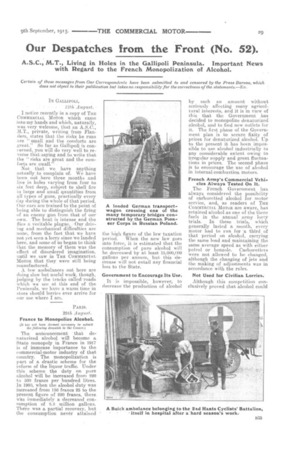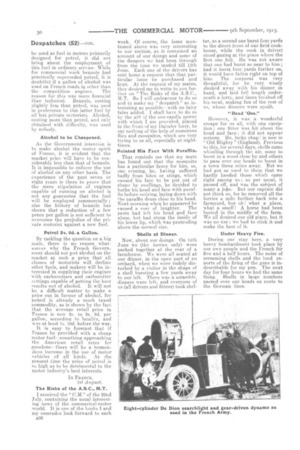Our Despatches from the Front (No. 52).
Page 9

Page 10

If you've noticed an error in this article please click here to report it so we can fix it.
A.S.C., M.T., Living in Holes in the Gallipoli Peninsula. Important News with Regard to the French Monopolization of Alcohol.
Certain of these messages from Our Correspondents have been submitted to and censored by the Press Bureau, tithich does not object to their publication but lakes no responsibility for the correctness of the statements.—ED,
IN GALLIPOLI,
12th August.
I notice recently in a copy of THE COMMERCIAL MOTOR which came into my hands and which, naturally, was very welcome, that an A.S.C., MT., private, writing from Flanders, states that the risks he runs are " small and the comforts are great." So far as Gallipoli is con-; cerned, you will do very well to reverse that,-.saying and to, write that the " risks are great and the com
forts are small.' . . .
Not that:: we have anything actually:to complain of. We have been out here three month S and live in holes varying, from four to six feet deep, subject to shell fire in large and small quantities from all types of guns, praCtically every day during the whole of that period. Our ears. are trained to-the point of being able to distinguish the firing of an enemy -gun from that of 'our' own. The heat is intense and the dies a v'eritable plague..Our driving and mechanical difficulties are none, from the fact that we have not yet seen a lorry since we landed here, and some of us began to think that the memory of them was the effect of disordered imagination, until we saw in THE COMMERCIAL MOTOR that they were still being in A few, ambulances out here are doing slow but useful work, though, judging by the tracks called-roads which we see at this end of the: Peninsula, we have a warni, time in store should lorries ever arrive for our use where I am.
PARIS.
19th August.
France to Monopolize Alcohol.
(It honot been deemed neeeosetry to oubmit the fottowing despatch to the Censor.)
The announcement that denaturized alcohol will become a State monopoly in Fiance in 1917 is of immense importance to the commercial-motor industry of that country. The monopolization is part of a drastic scheme for the reform of the liquor traffic. Under this scheme the duty on pure alcohol will be increased from 220 to 500 francs per hundred litres. in 1900, when the alcohol duty was increased from 156 francs 25 to the present figure of 920 francs, there Was immediately a decreased consumption of 8.8 million gallons. ThCre was a partial recovery, but the consumption never attained the high figure of the low taxation period. When the new law goes into force, it is estimated that the consumption of pure alcohol will be decreased by at least 15,000,600 gallons per annum but this decrease will not entail any financial loss to the State.
Government to Encourage Its Use.
It is impossible, however, to decrease the production of alcohol by such An amount. without seriously affecting • rriany agricidtural interests, and it is in view of this that the Government has decided to monopolize denaturized alcohol, and to find new Outlets for it. The first phase of the Government plan is to secure fixity of prices for denaturizeol alcohol. Up to the present it has been impossible to use alcohol industrially to any considerable extent owing to irregular supply and great fluctuations in prices. The second phase is to encourage the use of alcohol in internal-combustion motors.
French Army's Commercial Velades Always Tested On It.
The French Goverimient has always considered the possibility of carburetted alcohol for. motor service, and, as readers :of THE COMMERCIAL MOTOR are aware, has retained alcohol as one of the three fuels in the annual' army lorry trials: In these trials, .which generally lasted a month, every motor had to run for 'a third of that period on alcohol, carrying the same load and maintaining the same average speed as with either -Petrol or benzoic. Carburetters were not .allowed to be changed, although the changing of jets and the making of adjustments was in accordance with the rules.
Not Used for Civilian Lorries..
Although this competition conclusively proved that alcohol could be used as fuel in motors primarily designed for petrol, it did not bring about the employment_ of this fuel in ordinary service. Iknile for commercial work benzole had practically superseded petror, it is doubtful if a gallon of alcohol was used on French roads in other than the competition engines. The reason for this was more financial than technical. Benzole, costing slightly less than petrol, was used in preference to this latter fuel by all but private motorists. Alcohol, costing more than petrol, and only obtained with difficulty, was used by nobody.
Alcohol to be Cheapened.
As the Government intention is to make alcohol the motor spirit of France, it is evident that the market. price will have to be considerably less than that of benzoic. It is impossible to enforce the use of alcohol on any other basis. The experience of the past seven or eight years is there to prove that the mere stipulation of engines capable of running on alcohol is not any guarantee that the fuel will be employed 'commercially ; also the history of benzoic has shown that a reduction of a few pence per gallon is. riot sufficient to overcome the prejudice of the private motorist against a new fuel.
Petrol 2s. 2d. a Gallon.
By tackling the question on a big scale, there is no reason whatsoever why the French Government should not put alcohol on the market at such a price that all classes of motorists will decline other fuels, and makers will be interested in supplying their engines with carburetters and carburetter settings capable of getting the best results out of alcohol. It will not be a difficult matter to make a price cut in favour of alcohol, for petrol is already a much taxed commodity, as is shown by the fact that the average retail price in France is now 2s. to 2s. 2d. per gallon, according to locality, and was at least is. 10d, before the war.
It is easy to forecast .that if France be provided with a cheap motor fuel—something approaching the American retail rates for gasolene—there will be a tremendous increase in the use of motor vehicles of all kinds. At the present time the Price of petrol is so high as to be detrimental to the motor industry's best interests.
IN FRANCE,
/St _Aug t.
The Risks of the A.S.C., M.T.
I received the " C.111." of the 22nd July, containing the usual interesting news of the commerical-motor world. It is one of the books I and my comrades look forward to each
B36 week. Of course, the issue mentioned above was very interesting to our section, as it contained an account of our doings and some of the dangers we had been through from the time we landed till lath June. Each one of the drivers has sent home a request that that particular issue be purchased and kept. At the request of my mates, they desired me to write to you further on "The Risks of the A.S.C., M.T. So I will endeavour to do so and to make my " despatch " as interesting as possible—with no fairy tales added. I shall have to do so by the aid of the one-candle power with which I am provided, placed in the front of my Daimler lorry, to say nothing of the help of numerous flies and mosquitos, which are very trying to us all, especially at nighttimes.
Painted His Face With Paraffin.
That reminds me that my mate has found out that the mosquito has a particular fancy for him, so, one evening, he, having suffered badly from bites or stings, which caused his face to be put out of shape by swellings, he decided to bathe his head and face with paraf:An before retiring, laying down with the paraffin drum close to his head. Next morning when he appeared he caused a roar of laughter. The pests had left his head and face alone, but had stung the inside of his lower lip, which was protruding above the normal size.
Shells at Dinner.
Now, about our doings. On 14th June we (the lorries only) were parked together at the rear of a farmhouse. We were all seated at our dinner, in the open part of an orchard, when we were rudely disturbed by a visitor in the shape of a shell bursting a few yards away to our left. There was a scramble, dinners were left, and everyone of us (all drivers and fitters) took shel
ter, as a second one burst four yards to the direct front of our field cookhouse, while the cook (a driver) stood gazing at the place where the first one fell. He was not aware that one had burst so near to him ; had it burst four yards further on, it would have fallen right, on top of him. The corporal was very thoughtful, for he very wisely dashed away with his dinner in hand, and laid full length underneath a lorry, and there finished off his meal, making fun of the rest of us, whose dinners were spoilt.
"Dead 'Oss."
However, it was a wonderful escape for us ail, with one exception; one fitter was hit about the head and face ; it did not appear serious. He, lucky chap ! is now in " Old Blighty " (England). Previous to this, for several days, shells came whistling through the air, some to burst in a wood close by and others to pass over our heads to burst in a town three miles away. But we had got so used to them that we hardly heeded those which came right among us ; as per usual, it passed off, and was the subject of many a joke. But our captain did not think so, for he removed all the lorries a mile further back into a farmyard, but oh ! what a place, what a smell! A horse had been buried in the middle of the farm. We all desired our old place, but it was no use ; we had to stick it and make the best of it.
Under Heavy Fire.
During our stay here, a very heavy bombardment took place by our own people and the French five and a half hours. The noise of screaming shells and the loud reports of the firing of the guns is indescribable for my pen. The next day for four hours we had the same thing. Shells in large numbers passed over our heads en route to the German lines.






















